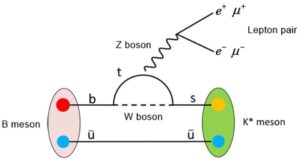Research
The Standard Model of particle physics has emerged from a strong interplay between theory and experiment, starting in the 1960s. It has turned out to be an extremely successful framework to describe the electroweak and strong interactions of elementary particles. The final ingredient – the Higgs boson – was observed by ATLAS and CMS in 2012. Apart from tensions in data for certain rare B-decay processes and the anomalous magnetic moment of the muon, the Standard Model was impressively confirmed by experiment. However, we have indications that the Standard Model cannot be complete where the baryon asymmetry of the universe is a key example. At the high-energy frontier given by the LHC, no signals for physics beyond the Standard Model have been found so far.
Perturbative QCD and collider phenomenology
In this era of particle physics, high-precision studies are in the spotlight as they may finally reveal imprints of physics from beyond the Standard Model. Here, the goal is to perform Standard Model calculations with highest precision and to identify the most promising processes and observables for experimental studies. Discrepancies between the Standard Model calculations and measurements would reveal the presence of new interactions and particles, which could have masses far too heavy to be directly produced at the LHC.
Understanding the perturbative description of Quantum Chromodynamics continues to play an important role in Standard Model “stress-tests”. The research interests of Eric Laenen, Wouter Waalewijn, Juan Rojo and Melissa van Beekveld here range from fixed order calculations to all-order resummations, jets production and substructure, the structure of the proton, studies in effective field theories to encode effects of beyond-the-standard model physics, and developing powerful simulation programs to model the physics at particle-physics colliders.
Flavour physics and the nature of neutrinos
The flavour sector, which describes interactions between different quark and lepton “flavours”, i.e. species of these particles, plays another outstanding role for testing the Standard Model with unprecedented precision. Anomalies in data for strongly suppressed B decays originating from quantum fluctuations indicate new particles and interactions, where the possibility of the violation of lepton flavour universality – a key feature of the Standard Model – is a particularly exciting option. Further studies are related to imprints of new sources of CP violation, in particular in B-meson decays. The theory group is at the forefront of the corresponding theoretical analyses and keeps strong links with physicists from the LHCb programme. The exploration of flavour physics and CP violation is the main research topic of Robert Fleischer.

In the lepton sector, the anomalous magnetic moment of the muon shows a long-standing puzzle. It may be linked to the rare B-decay anomalies and electric dipole moments. These flavour probes are also part of the theoretical physics programme, with a link to the eEDM programme at the VSI/RUG. Jordy de Vries applies chiral effective field theory for precision calculations for low-energy hadronic and nuclear observables related to experiments looking for Beyond-the-Standard Model physics. Examples include neutrinoless double beta decay, beta decays, and electric dipole moments.
The nature of neutrinos and their role for the baryon asymmetry of the universe, CP violation in the neutrino sector and the question of whether dark matter has a particle explanation are research interests of Jordy de Vries and Marieke Postma. Here links to the astroparticle / neutrino/multimessenger programme, including also calculations of interactions of cosmic rays with the atmosphere of the earth at highest energies, are established.
Cosmology and particle physics
The early universe provides a unique test bed for our theories of physics beyond the Standard Model, as the energy scales involved are many orders of magnitude larger than what can ever be reached in terrestrial particle accelerators. The research of Marieke Postma is motivated by the question what particle physics can tell us about the evolution of the universe and, in turn, what cosmology can teach us about the fundamental laws of nature from dark matter to topological defects, Higgs inflation and electroweak baryogenesis.
Past PhD projects
To give a better overview of our research interests, we list the topics of the PhD candidates that have graduated with a Nikhef affeliation in the last few years.
- The Power of Power Corrections C. Marinissen (2025)
- A high-resolution imaging of the collinear substructure of the proton G. Magni (2025)
- CP Violation in Rare B-Meson Decays A. E. Rehult (2025)
- Fingerprinting New Physics with Effective Field Theories J. ter Hoeve (2025)
- The Beauty of Flavour Physics – B Meson Decays: Do They Reveal New Physics? E. Malami (2024)
- B-Meson Decays as Probes of New Physics, R. L. Jaarsma (2024)
- On QCD Corrections to Jet Functions and Deep Inelastic Scattering, A. P. Basdew-Sharma (2023)
- Aspects of strong and new CP violation, S. Shain Poruvelil (2023)
- Precise Predictions for Jets and Tracks, S. Schrijnder van Velzen (2022)
- A top portal to new physics, M.P. de Beurs (2022)
- Sterile neutrinos and effective field theory, G. Zhou (2022)
- Dark matter bound states in the early universe |The role of scalar mediators, R. Oncala Mesa (2021)
- Subleading effects of soft emissions – A study of next-to-leading power threshold corrections to scattering amplitudes, J. S. Sinninghe Damste (2021)
- Exploring the substructure of nucleons and nuclei with machine learning, A. Rabah Khalek (2021)
- Jet substructure at the LHC with Soft Collinear Effective Theory, P. M. R. R. Cal (2021)

